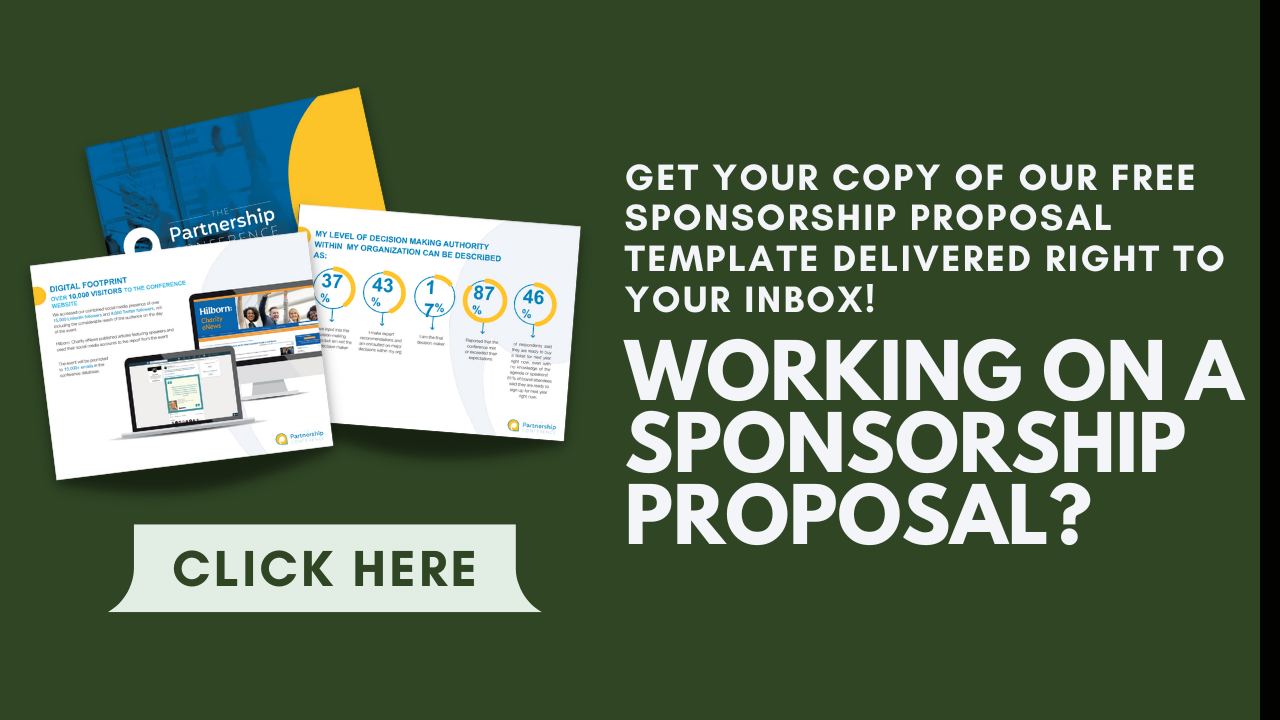
Before you dive in, if you are interested in sport sponsorship, check out these titles in our “sponsorship for sports” series:
Whether you’re a motorsports athlete or you excel in a different sport altogether, a sponsorship can increase your name recognition and put you on the map. That means your sponsorship proposal has to be perfect. What goes into the proposal?
Here’s how to write an athlete sponsorship proposal:
Sponsorship proposals are not the easiest part of putting together your sponsorship program, that’s for sure. With the templates and tips I have for you today, you can overcome this hurdle and get one step closer to sports sponsorship!
Before I jump into these tips, I recommend you have my tried and true sponsorship proposal template open so you can follow along. In that template, I go paragraph by paragraph and outline what goes into your sponsorship proposal.
The information in the template applies to all industries, including sports.
Okay, with that out of the way, let’s get started!
I don’t want you to waste too much time with your sponsorship proposal, as the more time you whittle away at it, the more sports sponsorship opportunities that can pass you by. That’s not to say you should rush either, but keep your sponsorship program moving swiftly.
Here’s a little tip to help you get your sponsorship proposal underway – start with the easy stuff. Yes, there is easy stuff in your proposal, such as the title page.
All you have to put there is a title, the date, the location, and your website. If you’re associated with an athletic organization, you can include their logo on the title page. If by chance you have your own logo, then use that instead.
Then you’re done. That was easy, right? I told you some of it would be.
Next, move on to your contact page, which is the last page of your sponsorship proposal. Here, you want a gripping call to action. At the very least, it should be something akin to “I want to hear from you!” If you can come up with something better, then go for it!
Then provide as much contact information as you can, from your website to your social media handles, email address, and your phone number.
Cool, that’s two pages done out of six. Don’t you feel like your proposal is going swimmingly already? Great, because it’s time to continue.
I won’t lie – the next four pages of your athlete sponsorship proposal will not be quick nor easy to write. If you’ve done your research though, it will all come together a lot more easily.
The page with your audience data–which is technically page two–is probably the most important in your athletic sponsorship proposal. I know, that’s a high-pressure statement, but no one knows how to work better under pressure than an athlete.
So as an athlete, who is your audience? That’s a great question. If you’re associated with a sports organization, then their audience would be your audience.
For instance, let’s say you’re an aspiring motorsports driver who works with a sports organization. If that organization only specializes in motorsports, then you can use the entirety of their audience data.
However, if the sports organization also branches out into other sports, then your audience is only the motorsports sector.
What I would normally tell a sponsorship seeker to do is send an audience survey, go through the responses, and create audience segments from there.
You can’t really do that in your position, so I recommend you review with your sports organization what the attendance numbers have been like for sporting events and who is in the audience.
Once you have your hands on this information, you want to niche down as much as you can. I always liken niching down audience data to opening a Russian nesting doll. When you pop open that first large doll, there’s a smaller doll inside it, right?

You wouldn’t stop there though, because you know that in the second doll, there’s a third one, and in the third doll, there’s a fourth one, and so on.
That’s what audience data is like when you niche it down. If you have that coveted 18-to-21 male group of sports attendees in your audience, you’d dig deeper into that segment.
Where do these men live? What do they do for a living? Student versus employee? How much money do they make? What other sports brands do they like?
Eventually, when opening Russian nesting dolls, the smallest doll has nothing in it. Likewise, when your audience segments are so hyper-niched that they’re too small for you to do anything more, you’re finished niching down your audience.
After putting together your audience segments, make appealing graphs and tables to showcase who your sports audience is. Then put that data in your sponsorship proposal.
Sponsorship is a careful balancing act. Although you want something for yourself (sponsorship money, in-kind gifts or donations, or promotions), you can’t make it too much about yourself. You must bring something to the table as well.
In your proposal, you have to discuss your sponsorship opportunity and talk about yourself while at the same avoiding veering too far into me-me-me territory.
This is where my sponsorship proposal template really comes in handy, as I cover the nuances of what to write on this second page.
I recommend taking this part of your athlete sponsorship proposal and breaking it up into three paragraphs.
In the first paragraph, you discuss your cause. This is where you can talk about who you are and what your sports accomplishments are (briefly, might I note).
Then, in the second paragraph, switch gears and begin discussing your proposed sponsorship opportunity.
In the third paragraph, you’d share your audience research. Talk about your audience a bit and then let the graphs and tables do the rest of the talking.
On the third page of your athlete sponsorship proposal is what’s known as the sponsorship package. You might also see this referred to as a sponsorship menu.
No, it’s not a menu like when you sit down to eat at a restaurant, although it’s not entirely dissimilar either. The sponsorship menu houses your assets, which are the tangible and intangible things you sell to a sponsor to earn dollars towards your goals, such as getting a new race car, a spiffy uniform, etc.
How in the world do you find assets to sell to the sponsor? You do your due diligence and discover them.
As a solo athlete, the variety of assets you can offer a sponsor varies. Since I’ve used motorsports as an example for much of this guide, I’ll continue to do so here. As a budding motorsports driver, one of the greatest assets you can provide to a sponsor is real estate on your race car.
A sponsor would pay to get their name and logo adorned on your vehicle. The more premium the spot–such as the front or the side of the car–the more money the placement should cost.
You can even offer sponsors a chance to put their name and logo on your racing uniform or helmet.
If you’ve read my posts about motorsports sponsorship, then you’ll recall how sponsors love this kind of asset. It’s a free promotion for them, after all. Every time you’re at an event or on TV, the sponsor’s name is displayed. Curious viewers will look them up and hopefully convert.
Of course, the value of this asset hinges on your sports performance. Athletes who succeed will naturally attract the attention of other sponsors who will want their names associated with the winning superstar as well.
Speaking of an asset’s value , that’s something you have to determine yourself. You can work with your sports organization to do this, but I recommend doing your own homework too. Look at local market value and use that as your guideline.
Once you have a collection of assets, you can arrange them by property in your sponsorship menu. Although there will be some hierarchy to how you sort the assets, please refrain from using sponsorship tiers such as gold, silver, and bronze.
I know, a tiered system like that seems like a natural way to organize your sports assets. Let me tell you that sponsors won’t find it nearly as endearing as you do. You don’t want to force the sponsor to lock into more assets than what they want.
If you give the sponsor free rein to choose assets at their leisure and your assets are affordably priced, you will get your money’s worth.
As you write your athlete sponsorship proposal, ask yourself, can I customize this? If you can, then it’s time to pick up the phone (or shoot an email) and have a pow-wow with the sponsor.
Tell them that you’re working on assets or activations (which are marketing opportunities that interlink the needs of your audience and the sponsor). You’re wondering what they think about Y idea and if it can be better.

Customizing your sponsorship package is a chance to put your head together with the sponsor and come up with something truly great. Yes, the sponsor might suggest some of their own ideas or recommend you nix certain assets or activations. Your sponsorship package won’t turn out exactly as you imagined it.
You know what you will have though? A sponsorship package that the sponsor genuinely wants to see, and assets that they’re truly interested in. That already puts you head and shoulders above the competition!
Writing a winning athlete sponsorship proposal involves detailed audience research, valuable assets, and customization from top to bottom.
Although you’ll change your proposal and the assets therein for every sponsor, the more proposals you write, the easier it gets. Good luck!

Chris Baylis is the Founder and Editor-in-Chief of The Sponsorship Collective.
After spending several years in the field as a sponsorship professional and consultant, Chris now spends his time working with clients to help them understand their audiences, build activations that sponsors want, apply market values to their assets and build strategies that drive sales.